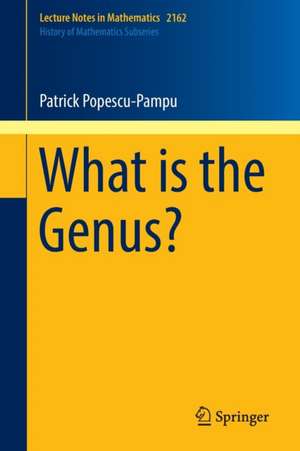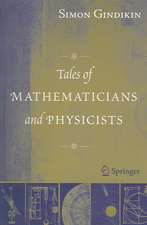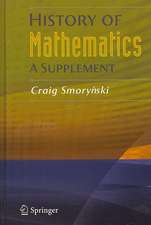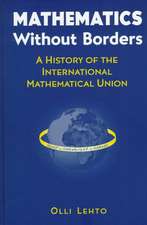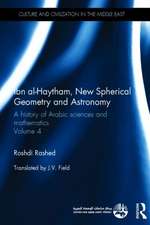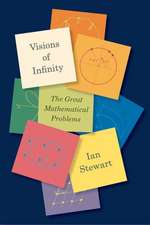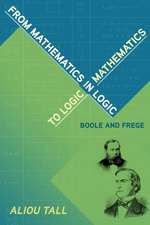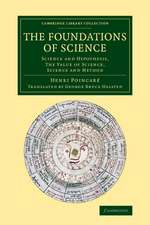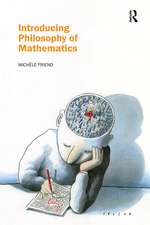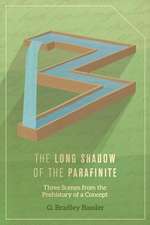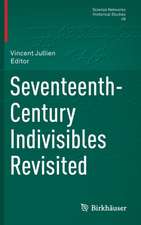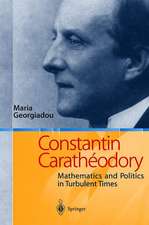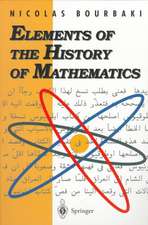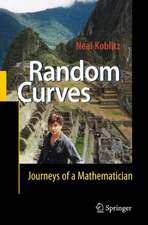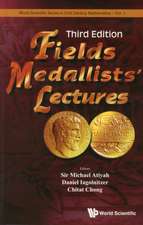What is the Genus?: Lecture Notes in Mathematics, cartea 2162
Autor Patrick Popescu-Pampuen Limba Engleză Paperback – 2 sep 2016
Exploring several of the evolutionary branches of the mathematical notion of genus, this book traces the idea from its prehistory in problems of integration, through algebraic curves and their associated Riemann surfaces, into algebraic surfaces, and finally into higher dimensions. Its importance in analysis, algebraic geometry, number theory and topology is emphasized through many theorems. Almost every chapter is organized around excerpts from a research paper in which a new perspective was brought on the genus or on one of the objects to which this notion applies. The author was motivated by the belief that a subject may best be understood and communicated by studying its broad lines of development, feeling the way one arrives at the definitions of its fundamental notions, and appreciating the amount of effort spent in order to explore its phenomena.
Din seria Lecture Notes in Mathematics
-
 Preț: 456.57 lei
Preț: 456.57 lei -
 Preț: 120.52 lei
Preț: 120.52 lei - 17%
 Preț: 360.42 lei
Preț: 360.42 lei -
 Preț: 175.68 lei
Preț: 175.68 lei -
 Preț: 197.00 lei
Preț: 197.00 lei -
 Preț: 279.76 lei
Preț: 279.76 lei -
 Preț: 477.65 lei
Preț: 477.65 lei - 17%
 Preț: 361.88 lei
Preț: 361.88 lei -
 Preț: 252.37 lei
Preț: 252.37 lei -
 Preț: 351.41 lei
Preț: 351.41 lei -
 Preț: 138.88 lei
Preț: 138.88 lei -
 Preț: 152.61 lei
Preț: 152.61 lei -
 Preț: 116.67 lei
Preț: 116.67 lei -
 Preț: 102.77 lei
Preț: 102.77 lei -
 Preț: 119.02 lei
Preț: 119.02 lei - 17%
 Preț: 365.52 lei
Preț: 365.52 lei -
 Preț: 396.75 lei
Preț: 396.75 lei - 17%
 Preț: 362.12 lei
Preț: 362.12 lei -
 Preț: 396.11 lei
Preț: 396.11 lei -
 Preț: 357.78 lei
Preț: 357.78 lei - 17%
 Preț: 362.31 lei
Preț: 362.31 lei -
 Preț: 403.80 lei
Preț: 403.80 lei - 17%
 Preț: 361.70 lei
Preț: 361.70 lei -
 Preț: 496.21 lei
Preț: 496.21 lei -
 Preț: 453.71 lei
Preț: 453.71 lei -
 Preț: 395.90 lei
Preț: 395.90 lei -
 Preț: 484.00 lei
Preț: 484.00 lei -
 Preț: 420.90 lei
Preț: 420.90 lei -
 Preț: 484.00 lei
Preț: 484.00 lei -
 Preț: 328.14 lei
Preț: 328.14 lei -
 Preț: 323.38 lei
Preț: 323.38 lei -
 Preț: 347.74 lei
Preț: 347.74 lei -
 Preț: 328.89 lei
Preț: 328.89 lei -
 Preț: 405.37 lei
Preț: 405.37 lei -
 Preț: 325.86 lei
Preț: 325.86 lei -
 Preț: 418.20 lei
Preț: 418.20 lei -
 Preț: 274.04 lei
Preț: 274.04 lei -
 Preț: 421.49 lei
Preț: 421.49 lei -
 Preț: 418.97 lei
Preț: 418.97 lei -
 Preț: 501.30 lei
Preț: 501.30 lei -
 Preț: 418.97 lei
Preț: 418.97 lei -
 Preț: 272.90 lei
Preț: 272.90 lei -
 Preț: 332.72 lei
Preț: 332.72 lei -
 Preț: 419.18 lei
Preț: 419.18 lei -
 Preț: 493.85 lei
Preț: 493.85 lei -
 Preț: 270.80 lei
Preț: 270.80 lei -
 Preț: 424.89 lei
Preț: 424.89 lei -
 Preț: 373.45 lei
Preț: 373.45 lei -
 Preț: 423.97 lei
Preț: 423.97 lei -
 Preț: 323.55 lei
Preț: 323.55 lei
Preț: 534.11 lei
Nou
Puncte Express: 801
Preț estimativ în valută:
102.25€ • 105.39$ • 86.21£
102.25€ • 105.39$ • 86.21£
Carte tipărită la comandă
Livrare economică 27 februarie-13 martie
Preluare comenzi: 021 569.72.76
Specificații
ISBN-13: 9783319423111
ISBN-10: 3319423118
Pagini: 202
Ilustrații: XVII, 184 p. 20 illus.
Dimensiuni: 155 x 235 x 11 mm
Greutate: 3.17 kg
Ediția:1st ed. 2016
Editura: Springer International Publishing
Colecția Springer
Seriile Lecture Notes in Mathematics, History of Mathematics Subseries
Locul publicării:Cham, Switzerland
ISBN-10: 3319423118
Pagini: 202
Ilustrații: XVII, 184 p. 20 illus.
Dimensiuni: 155 x 235 x 11 mm
Greutate: 3.17 kg
Ediția:1st ed. 2016
Editura: Springer International Publishing
Colecția Springer
Seriile Lecture Notes in Mathematics, History of Mathematics Subseries
Locul publicării:Cham, Switzerland
Cuprins
Preface.-Introduction.-Algebraic curves.-Algebraic surfaces.-Higher dimensions.-Epilogue.-Bibliography.-Index.
Recenzii
“This book provides a fascinating—yet technically quite demanding—tour of the ideas and generalizations that feed into our modern conception of the genus. It should therefore serve as a useful starting point for historical and even philosophical investigations into past mathematical practice of forming and shaping concepts. It may also be useful in teaching advanced mathematical content with a view to historical development … .” (Henrik Kragh Sørensen, ISIS, Vol. 109 (2), June, 2018)
“This book is addressed to any person with a little knowledge of mathematics (such as an undergraduate student) who wants to get an idea of some of the most important concepts that arose in geometry and topology in the last couple of centuries: the author has made a commendable effort to explain all the more advanced concepts almost from scratch (but obviously this was not possible for the last chapter).” (Pietro De Poi, Mathematical Reviews, July, 2017)
Textul de pe ultima copertă
Exploring several of the evolutionary branches of the mathematical notion of genus, this book traces the idea from its prehistory in problems of integration, through algebraic curves and their associated Riemann surfaces, into algebraic surfaces, and finally into higher dimensions. Its importance in analysis, algebraic geometry, number theory and topology is emphasized through many theorems. Almost every chapter is organized around excerpts from a research paper in which a new perspective was brought on the genus or on one of the objects to which this notion applies. The author was motivated by the belief that a subject may best be understood and communicated by studying its broad lines of development, feeling the way one arrives at the definitions of its fundamental notions, and appreciating the amount of effort spent in order to explore its phenomena.
Caracteristici
Presents, through the works of the pioneers, the sophisticated evolution of one of the most important notions of geometry and topology Features many illustrations which aid the understanding of the more complicated constructions Excepting M. Audin's novel La formule de Stokes, there are no similar books Explains many connections between analysis, algebra, number theory, geometry and topology Includes supplementary material: sn.pub/extras
